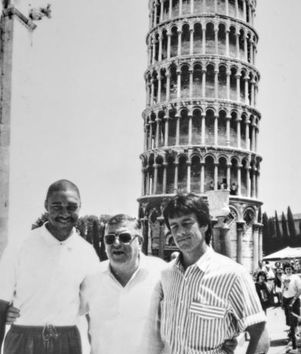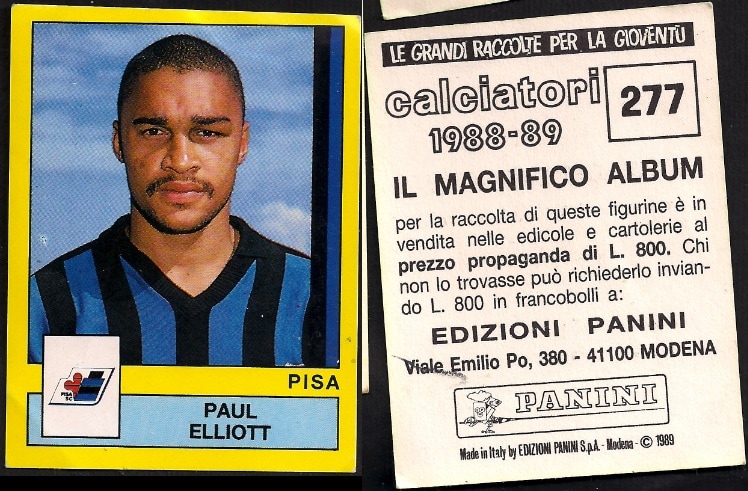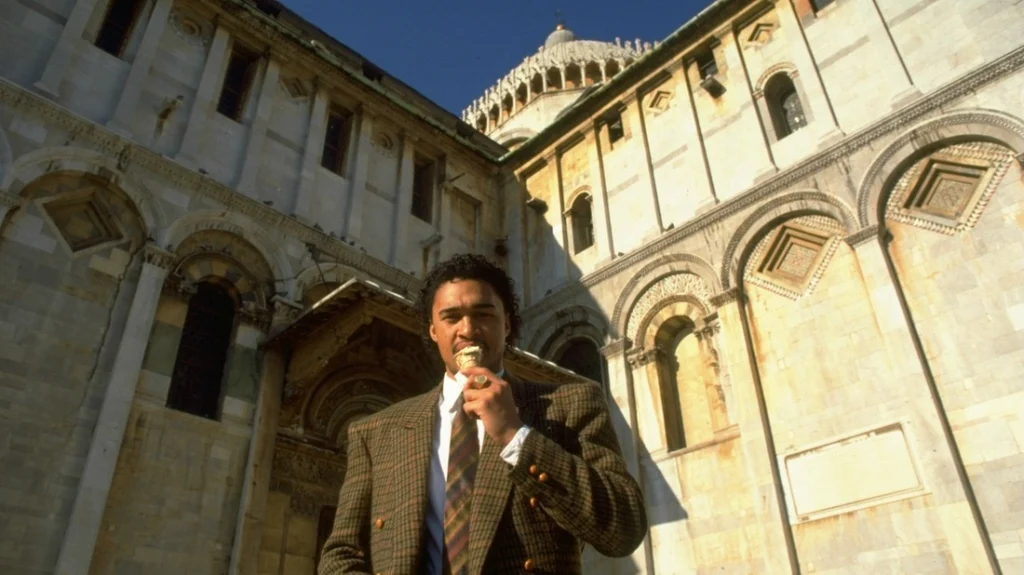“When I got transferred to Pisa, my first game was against AC Milan. I marked the great Ruud Gullit and I always remember when I challenged for the ball with him in the air, one of his dreadlocks poked me in the eye…it gave me a bloodshot eye for about two weeks. That was kind of a highlight.”
 Romeo Anconetani officially presenting Elliot and Dunga in front of the Leaning Tower
Romeo Anconetani officially presenting Elliot and Dunga in front of the Leaning Tower
In August 1987, when newly promoted A.C. Pisa prepared to host an AC Milan buoyed by the recent investment of multi-media magnate Silvio Berlusconi, Paul Elliott hadn’t even heard of Ruud Gullit.
It was Elliott’s Serie A debut for the Tuscan side, but as Pisa Coach Giuseppe Materazzi ran through Milan’s star studded line-up, Elliott was unmoved. Franco Baresi, Marco Van Basten, Frank Rijkaard, Carlo Ancelotti and of course Ruud Gullitt were just a few of the marquee names that undoubtedly sent chills down Pisan spines. All but one that is. “Who are they?”, the Englishman blurted out, “I have never heard of them.” Elliot spoke no Italian, and none of his teammates spoke English, but this faux pas needed no translating.
Pisa were comfortably beaten 3-1. At the final whistle, along with having a bloodshot eye, Elliott no longer held any doubts about the quality and identity of his opponents. It was a baptism of fire and in Elliott’s defence, he was young and naïve, a fact he later recognised when recounting the story to the Evening Standard.
“In those days, English football was very insular. I was one of the first to go abroad. I was only 22 when I went to Italy and I knew nothing about world football.”
Elliott spent two years in Tuscany and while his injury travails curtailed his progress, he remains an important part of Pisa’s history, both for his talent and his contribution to the club’s Serie A survival during the 1987/88 season.
Among British Calcio fans, Elliott is perhaps better known for his appearances as a pundit on Channel 4’s Football Italia. The former Chelsea man often played second fiddle to the show’s charismatic and inimitable presenter, James Richardson. But in truth, Elliot’s talent on the field far exceeded his capacity for punditry.
Having impressed during spells in the English First Division with Luton Town and Aston Villa, Elliott took the plunge into Italian football during the summer of 1987. Fuelled by an influx of financial investment, Serie A was quickly becoming the most competitive league in the world. Having just won promotion to this paradiso, Pisa’s legendary president, Romeo Anconetani, was under no illusions that recruiting shrewdly would be crucial to the clubs top flight survival.
Elliott was bought to the Torri to play at the heart of the defence alongside sweeper, Mario Faccenda. However, the Englishman was by no means the clubs only notable summer signing. Pisa also captured a plucky Brazilian midfielder by the name of Dunga, and the future World Cup winner quickly established himself at the fulcrum of the Pisan midfield.
At around six foot three, Elliott’s imposing figure immediately made an impression on the Pisani, earning him comparisons to the cities leaning tower. Yet, like the venerated edifice, his early performances in black and blue appeared anything but steady.
After losing to Milan, another three defeats followed. Elliott looked out of his depth. Even his dynamism and physical presence failed to gloss over his tactical shortcomings. Then came a turning point. Having missed a couple of games through injury, Elliott returned to produce a resolute performance and help his side earn a 1-0 victory over Tuscan rivals, Empoli. It was Pisa’s first victory of the season.
A string of positive results followed, including two famous victories over historic rivals Fiorentina and Milanese giants Inter, the latter including a Dunga blockbuster from range. Meanwhile, Elliott and Faccenda were forging a formidable partnership in central defence. The two complemented each other, the Italian dropping off and playing as a Libero, while Elliott played in a more advanced position, using his aerial prowess, physicality and reading of the game to snuff out threats before they developed.
His composure in possession allowed him to initiate attacks from defence and the Englishman even demonstrated a striker’s instinct, netting in Pisa’s narrow 2-1 defeat against Juventus. Elliott had settled and begun enjoying life on the peninsula. He even found the time to enjoy La Dolce Vita, sampling Italy’s nightlife with teammates Luca Cecconi and Lamberto Piovanelli shortly before a game against Ascoli. The transgression promptly saw him dropped by coach Materazzi.
But fate soon dealt him a much crueller blow. Having cemented his place in Materazzi’s starting line-up, Elliott’s injury woes began after he was forced off against Cesena. He never fully recovered. Pisa went on to secure their Serie A status thanks to a final day victory over Torino. The Torri also enjoyed success on the European stage, as they lifted the Mitropa Cup for the second time in their history. However, Elliott could only watch events unfold from the side-lines, as injury saw him sit out the rest of the season.
 Paul Elliot’s Panini sticker while at Pisa
Paul Elliot’s Panini sticker while at Pisa
It would be the story of Elliott’s Italian career. Having made just 10 appearances during his debut season, he added just 13 more the year after. Pisa’s malaise on the field compounded matters and they were eventually relegated at the end of the 1988/89 season. Stefano Cuoghi – a former teammate of Elliott’s and future head coach of Pisa – maintained that had the colossal defender not been injured, the Nerazzurri wouldn’t have been relegated. It was testament to his status in Pisa.The supporters appreciated him too. On a fanzine, one Pisano wrote that without serious injury, Elliott could have left a “real legacy” at the club, while another simply labelled him “un grande giocatore” – a great player.
But for Elliott, Italy was never truly home and he allegedly spent a fortune on phone bills in order to keep in contact with his girlfriend and family, who remained in England. When Pisa were relegated, the then 24-year-old returned to British shores to play for Celtic. After enjoying successful spells in Scotland and then at Chelsea, a horrific knee injury finally put pay to Elliott’s career.
While his time in Italy cannot be considered an untrammelled success, to this day he is remembered fondly in Pisa. He was a cultured defender who combined steel, skill and courage. These were traits he demonstrated on the pitch, but also in his decision to move to Italy. Ex-Celtic forward and teammate John Hartson commended this decision.
“I admire Elliott’s bravery in moving to Pisa in the first place. That took real guts… He showed he had the class to play in Serie A.”
In many ways, Elliott was a trailblazer, both then and now. Today, there remains a dearth of young English footballers plying their trade abroad. No doubt it would be beneficial to their development, just as it was for Elliott. That is why, regardless of his injuries, this Englishman’s Italian exploits were particularly impressive.

